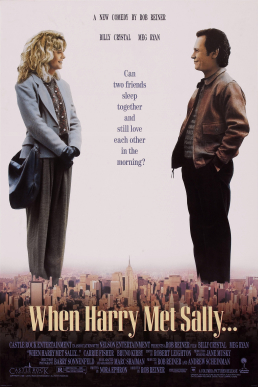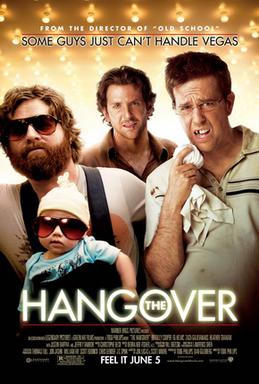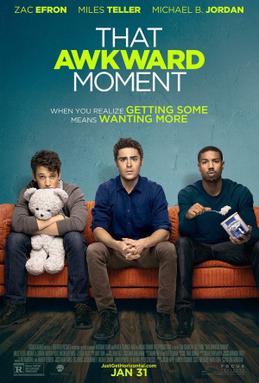Related Research Articles

The comedy film is a film genre that emphasizes humor. These films are designed to amuse audiences and make them laugh. Films in this genre typically have a happy ending, with dark comedy being an exception to this rule. Comedy is one of the oldest genres in film, and it is derived from classical comedy in theatre. Some of the earliest silent films were slapstick comedies, which often relied on visual depictions, such as sight gags and pratfalls, so they could be enjoyed without requiring sound. To provide drama and excitement to silent movies, live music was played in sync with the action on the screen, on pianos, organs, and other instruments. When sound films became more prevalent during the 1920s, comedy films grew in popularity, as laughter could result from both burlesque situations but also from humorous dialogue.

Romantic comedy is a sub-genre of comedy and romance fiction, focusing on lighthearted, humorous plot lines centered on romantic ideas, such as how true love is able to surmount all obstacles.

Screwball comedy is a film subgenre of the romantic comedy genre that became popular during the Great Depression, beginning in the early 1930s and thriving until the early 1950s, that satirizes the traditional love story. It has secondary characteristics similar to film noir, distinguished by a female character who dominates the relationship with the male central character, whose masculinity is challenged, and the two engage in a humorous battle of the sexes.

When Harry Met Sally... is a 1989 American romantic comedy film directed by Rob Reiner and written by Nora Ephron. Starring Billy Crystal, Meg Ryan, Carrie Fisher, and Bruno Kirby, it follows the title characters from the time they meet in Chicago and share a drive to New York City through twelve years of chance encounters in New York, and addresses the question "Can men and women ever just be friends?"

Chasing Amy is a 1997 American romantic comedy-drama film written and directed by Kevin Smith and starring Ben Affleck, Joey Lauren Adams and Jason Lee. The third film in Smith's View Askewniverse series, the film is about a male comic artist (Affleck) who falls in love with a lesbian (Adams), to the displeasure of his best friend (Lee).

Yuri, also known by the wasei-eigo construction girls' love, is a genre of Japanese media focusing on intimate relationships between female characters. While lesbian relationships are a commonly associated theme, the genre is also inclusive of works depicting emotional and spiritual relationships between women that are not necessarily romantic or sexual in nature. Yuri is most commonly associated with anime and manga, though the term has also been used to describe video games, light novels, and literature.

Romance films involve romantic love stories recorded in visual media for broadcast in theatres or on television that focus on passion, emotion, and the affectionate romantic involvement of the main characters. Typically their journey through dating, courtship or marriage is featured. These films make the search for romantic love the main plot focus. Occasionally, romance lovers face obstacles such as finances, physical illness, various forms of discrimination, psychological restraints or family resistance. As in all quite strong, deep and close romantic relationships, the tensions of day-to-day life, temptations, and differences in compatibility enter into the plots of romantic films.

In ethology and social science, male bonding or male friendship is the formation of close personal relationships, and patterns of friendship or cooperation between males. Male bonding is a form of homosociality, or social connection between individuals of the same gender. Male bonding can occur through various contexts and activities that build emotional closeness, trust, and camaraderie. Male bonding is an important feature of men’s social functioning and can provide benefits including emotional support and intimacy, shared identity, and personal fulfillment contributing to men’s mental health and wellbeing.
In sociology, homosociality means same-sex relationships that are not of a romantic or sexual nature, such as friendship, mentorship, or others. Researchers who use the concept mainly do so to explain how men uphold men's dominance in society.

The buddy film is a subgenre of adventure and comedy film in which two people go on an adventure, mission, or road trip. The two typically are males with contrasting personalities. The contrast is sometimes accentuated by an ethnic difference between the two. The buddy film is commonplace in Western cinema; unlike some other film genres, it endured through the 20th century with different pairings and different themes.

A stag film is the euphemistic term for a type of pornographic film of underground productions beginning in the late 1900s until the late 1960s of the 20th century when major Hollywood productions of adult films became mainstream. Typically, stag films had certain traits. They were brief in duration, were silent, depicted softcore or hardcore pornography and were produced clandestinely due to censorship laws. Stag films were screened for all-male audiences in fraternities or similar locations; observers offered a raucous collective response to the film, exchanging sexual banter and achieving sexual arousal. Stag films were often screened in brothels.
Wingman is a role that a person may take when a friend needs support with approaching potential romantic partners. People who have a wingman can have more than one wingman. A wingman is someone who is on the "inside" and is used to help someone with intimate relationships. In general, one person's wingman will help them avoid attention from undesirable prospective partners or attract desirable ones, or both.

I Love You, Man is a 2009 American bromantic comedy film written and directed by John Hamburg, based on a script by Larry Levin. The film stars Paul Rudd as a friendless man looking for a best man for his upcoming wedding. However, his new best friend is straining his relationship with his bride.

A bromance is a very close and non-sexual relationship between two or more men. It is an exceptionally tight, affectional, homosocial male bonding relationship exceeding that of usual friendship, and is distinguished from normal friendship by a particularly high level of emotional intimacy. The emergence of the concept since the beginning of the 21st century has been seen as reflecting a change in societal perception and interest in the theme, with an increasing openness of Western society in the 21st century to reconsider exclusivity constraints. The female version of the bromance is the womance.

The Hangover is a 2009 American comedy film directed by Todd Phillips, and written by Jon Lucas and Scott Moore. It is the first installment in The Hangover trilogy. The film stars Bradley Cooper, Ed Helms, Zach Galifianakis, Heather Graham, Justin Bartha, and Jeffrey Tambor. It tells the story of Phil Wenneck (Cooper), Stu Price (Helms), Alan Garner (Galifianakis), and Doug Billings (Bartha), who travel to Las Vegas for a bachelor party to celebrate Doug's impending marriage. However, Phil, Stu, and Alan wake up with Doug missing and no memory of the previous night's events, and must find Doug before the wedding can take place.
Herbivore men is a term used in Japan to describe young men who become voluntarily celibate and express little interest in getting married or being assertive in pursuing relationships with women. The term was coined by the author Maki Fukasawa, who initially intended for it to describe a new form of masculinity that was not reliant on the proactivity and assertiveness typically associated with masculinity in Japan. Philosopher Masahiro Morioka defines herbivore men as "kind and gentle men who, without being bound by manliness, do not pursue romantic relationships voraciously and have no aptitude for being hurt or hurting others." According to Fukasawa, herbivore men are "not without romantic relationships, but have a non-assertive, indifferent attitude toward desires of flesh."
A womance is a close but non-sexual, non-romantic relationship between two or more women. It is an exceptionally tight affectional, homosocial female bonding relationship exceeding that of usual friendship, and is distinguished by a particularly high level of emotional intimacy.

That Awkward Moment is a 2014 American bromantic comedy drama film written and directed by Tom Gormican in his directorial debut. The film stars Zac Efron, Miles Teller, Michael B. Jordan, Imogen Poots, Mackenzie Davis, and Jessica Lucas. The film had its Los Angeles premiere on January 27, 2014, and it was widely released on January 31 in the United States.

The Wedding Ringer is a 2015 American buddy romantic comedy film directed and co-written by Jeremy Garelick. It stars Kevin Hart, Josh Gad, and Kaley Cuoco-Sweeting. The film was produced by Adam Fields, Will Packer Productions and Miramax, distributed by Screen Gems, and released on January 16, 2015.
A bromance is a close but non-sexual relationship between two or more men.
References
- 1 2 Patterson, John (April 10, 2009). "True Bromance". The Guardian . Archived from the original on 2015-06-23.
- 1 2 3 4 Bookey, Mike (March 25, 2009). "Bromantic Comedy: Actors Squeeze Formulaic Plot For All Its Laughs". The Source Weekly . Archived from the original on 2015-06-26.
- ↑ "Bromance Definition & Meaning". Merriam-Webster . Archived from the original on 2012-05-14.
- 1 2 Ramanujam, Srinivasa (March 3, 2015). "Coming soon, a 'bromantic' comedy". The Hindu . Archived from the original on 2021-12-23.
- 1 2 3 DeAngelis, Michael. Reading the Bromance. Homosocial Relationships in Film and Television. Wayne State University Press. 2014. ISBN 9780814338988
- 1 2 3 Batyreva, Amina (January 19, 2013). "Our romance with the "bromance"". The McGill Daily . Archived from the original on 2013-01-21.
- ↑ "King of bromance: Judd Apatow". The Independent . August 19, 2009. Archived from the original on 2009-08-20.
- ↑ Denby, David (July 16, 2007). "A Fine Romance". The New Yorker . Archived from the original on 2014-08-30.
- 1 2 3 4 5 6 7 8 9 10 11 12 Aisenberg, Joseph (July 31, 2009). "Here Come the Bromides: Living in the Era of the Bromantic Comedy". Bright Lights Film Journal .
- ↑ Shary, Timothy. Millennial Masculinity: Men in Contemporary American Cinema. Wayne State University Press (2012) ISBN 978-0814334355
- ↑ Text of Love's Labour's Lost at MIT.edu
- 1 2 Tranquilli, Marissa (February 7, 2014). "That Awkward Boredom: A Bromantic Comedy". The Cornell Daily Sun . Archived from the original on June 26, 2015.
- ↑ Woudhuysen, H. R., ed. Love's Labours Lost (London: Arden Shakespeare, 1998): 61.
- 1 2 Cateridge, James. Film Studies For Dummies. John Wiley & Sons (2015) ISBN 9781118886533 page 120.
- ↑ Setoodeh, Ramin (June 8, 2009). "Isn't It Bromantic?". Newsweek . p. 73 – via Academic OneFile.
- 1 2 3 Alberti, John (March 2013). "'I Love You, Man': Bromances, the Construction of Masculinity, and the Continuing Evolution of the Romantic Comedy". Quarterly Review of Film and Video. 30 (2): 159–172. doi:10.1080/10509208.2011.575658. S2CID 192199146.
- ↑ Filippo, Maria San. The B Word: Bisexuality in Contemporary Film and Television. Indiana University Press (2013) ISBN 9780253008923. Page 225-226.
- 1 2 3 4 5 6 Stewart, Sara (January 30, 2014). "'Awkward' is the latest evolution in bromantic comedy". New York Post . Archived from the original on 2014-02-01. Retrieved December 23, 2021.
- 1 2 Wilonsky, Robert (March 18, 2009). "I Love You Man Reaches Bromantic Comedy's Greatest Heights". The Village Voice . Archived from the original on 2020-09-08.
- ↑ Gleiberman, Owen (March 18, 2009). "I Love You, Man". Entertainment Weekly . Archived from the original on 2015-06-24.
- ↑ "I Love You, Man", Metacritic
- ↑ "I Love You, Man". Premiere . March 19, 2009. Archived from the original on May 31, 2009.
- ↑ Viertel, Jack. The Secret Life of the American Musical; How Broadway Shows are Built. Sarah Crichton Books. (2016) ISBN 978-0374256920. page 15
- ↑ Freeman, Hadley (April 1, 2015). "The once-mighty bromance is dead – and Get Hard killed it". The Guardian . Archived from the original on 2015-04-01.
- 1 2 Baumgarten, Marjorie (January 2, 2015). "The Interview review". Austin Chronicle . Archived from the original on 2020-02-20. Retrieved December 23, 2021.
- ↑ Garfield, Robert. Breaking the Male Code: Unlocking the Power of Friendship. Gotham (2015) ISBN 978-1592409044.
- ↑ DeAngelis, Michael. Radner, Hillary. Reading the Bromance: Homosocial Relationships in Film and Television. "Grumpy Old Men; Bros Before Hos". Wayne State University Press (2014) ISBN 9780814338995. Page 52.
- ↑ Hartwell, David B. (2013). True Bromance: Representation of Masculinity and Heteronormative Dominance in the Bromantic Comedy. University of North Texas.
- ↑ "The Wedding Ringer Review". IGN. 16 January 2015. Retrieved 18 January 2015.
- 1 2 Gilman, Greg (January 31, 2014). "'That Awkward Moment' Reviews: Is This Bromantic Comedy Actually Funny?". The Wrap . Archived from the original on 2015-06-24.
- ↑ Ordoña, Michael (January 15, 2015). "'Wedding Ringer' review: A bromantic comedy that goes there". SF Gate . Archived from the original on 2015-01-16. Retrieved December 23, 2021.
- ↑ DeAngelis, Michael. Reading the Bromance. Homosocial Relationships in Film and Television. Wayne State University Press (2014) ISBN 978-0814338988. According to DeAngelis, a difference between the "buddy film" and the "bromance" narrative is that "women are often treated misogynistically as loving yet controlling and annoying interferences whose demands must always be 'dealt with.'" And later DeAngelis describes this as a structure "central to bromance".
- ↑ Bindley, Katherine (April 7, 2008). "Bromances aren't uncommon as guys delay marriage". The Seattle Times . Archived from the original on 2015-08-11.
- ↑ "Needs More Gay… Bromantic Comedies". The Backlot. January 26, 2011. Archived from the original on June 23, 2015.
- ↑ Sickels, Robert, D. 100 Entertainers Who Changed America: An Encyclopedia of Pop Culture Luminaries. ISBN 9781598848311. page 21
- ↑ Setoodeh, Ramin (2009-05-28). "The Hangover: The Bromance of Summer". Newsweek. Retrieved 2022-07-18.
- ↑ Saito, Stephen (March 15, 2009). "SXSW 2009: The "It" Factor". IFC . Archived from the original on May 17, 2013.
- ↑ Williams, Alex (June 17, 2013). "Bromantic comedy "This Is the End" does not disappoint". The Daily Texan . Archived from the original on 2021-04-12. Retrieved December 23, 2021.
- ↑ Poppe, Nathan (May 9, 2014). "Movie review: Neighbors". The Oklahoman . Archived from the original on 2021-12-23. Retrieved December 23, 2021.
- ↑ Moore, Roger (January 15, 2015). "Movie review: 'Wedding Ringer' is an amusing bromantic comedy". The News & Observer . Archived from the original on June 23, 2015. Retrieved December 23, 2021.
- 1 2 3 Scott Kearman (April 20, 2010). "Boston Bromance". Stuff. pp. 31–33.